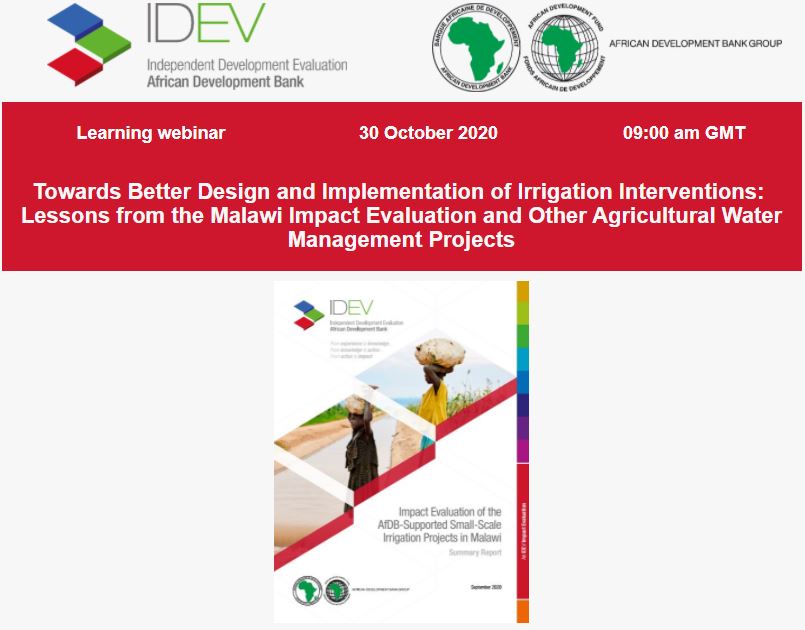
Leveraging knowledge from completed evaluations and meaningfully applying it in operational processes is critical to encouraging positive change in development organizations. Lessons from evaluations, if properly taken into account and integrated into new policies, strategies, projects and processes, will help to improve the quality of design and implementation, make interventions more effective, efficient and sustainable, and ultimately strengthen development impact.
After a successful impact evaluation of two African Development Bank-supported small-scale irrigation projects in Malawi, the Independent Development Evaluation, in collaboration with the Bank’s Country Office in Malawi and the Agriculture & Agro-Industry and Agricultural Finance & Rural Development departments, organized a webinar for internal Bank stakeholders themed: “Towards Better Design and Implementation of Irrigation Interventions: The Case of Malawi”.
This learning event took place on 30 October 2020 and aimed at engaging with the Bank’s Management and operations teams working on agriculture, water, and irrigation projects. Over 80 people from different operations departments participated. The two-hour discussion provided a better understanding of the factors that affect the development outcomes of irrigation projects and existing opportunities to incorporate the lessons and recommendations from evaluations into the design of future Bank irrigation interventions.
Following the opening of the event by Malawi Country Office Manager Eyerusalem Fasika, Girma Kumbi, Chief Evaluation Officer at IDEV and task manager of the impact evaluation of the Bank’s small-scale irrigation projects in Malawi, presented five lessons from the evaluation which positively influenced the agricultural sector, and will inform ongoing and future Bank irrigation interventions to improve performance and impact. They include:
- The capacity and governance systems of local institutions in small-scheme irrigation projects is important;
- Creating markets for farmers shouldn’t be limited to building market infrastructures alone;
- The technical quality of construction designs is determining for the proper utilization of irrigation schemes;
- Women should be empowered in irrigation farming, as their engagement will help improve households’ welfare; and
- Improved food security and food diversity may not necessarily lead to improvement in child nutrition.
These lessons also benefited other Bank Regional Member Country offices.
Subsequently, Vinda Kisyombe, Senior Agricultural Economist from the Bank’s Southern Africa Regional Development and Business Delivery Office, made a presentation on how the Bank systematically integrates knowledge from IDEV’s evaluations into the design and implementation of Bank irrigation Interventions. For example, to address the weak farmer organization, inadequate capacity building and beneficiary dependency syndrome found by previous evaluations, recent projects have included components on support to farmer institutions, with resources earmarked for farmer training, farm equipment and starter packs for farm inputs, and establishment of more viable farmer organizations run by professionals.
In addition, a flagship initiative of the Bank’s “Feed Africa” Strategy was presented during the webinar to demonstrate the benefits of maximizing irrigation projects from an agro-processing, marketing and institutional perspective. Set out by Chukwuma Ezedinma, Principal Agricultural Economist, Rural Infrastructure Development in the Bank’s Agricultural Finance & Rural Development department, the initiative named “Special Agro Industrial Processing Zones (SAPZ)” is a set of agro-based spatial development initiatives, purposely built shared facilities, to enable agricultural producers, processors, aggregators and distributors to operate in the same vicinity to reduce transaction costs and share business development services for increased productivity and competitiveness. Its irrigation infrastructure component enabled a consistent supply of agricultural raw materials, an end-to-end agro industrial ecosystem, provision of guaranteed markets to farmers, and aligned farmer and private sector interests. To meet the intended objectives of this initiative, moving forward:
- The Bank will strive to upscale activities in the agricultural sector to maximize the benefits of existing and future irrigation facilities and expand markets for farmers; and
- The sector departments of the Bank will proceed to dialogue with other development partners to explore co-financing opportunities for the development of SAPZ in Malawi.
During the Q&A, participants asked questions about the causes of underuse of marketing infrastructures. One participant was curious to learn how the evaluators managed to measure the specific impacts of irrigation, considering that increases in production and yield can be due to multiple factors, including fertilizers, improved seed, etc.
Download other event materials below:
Presentation Chukwuma: Maximizing the benefits of irrigation projects
Presentation Girma: Impact Evaluation Malawi irrigation - Key findings and lessons
Presentation Kisyombe: Bank’s Support to Irrigation Investment projects in Malawi
Poster: Impact Evaluation of Irrigation Development in Malawi

